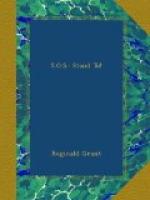When it got to the wagon line the crew on the truck commenced to pull it down as rapidly as they could, but when half-way to the ground a flying shell split the cable in twain as neatly as it could have been done with a razor blade, and the bag floated away with the remaining two men out over the German lines. When the descent had commenced two of the crew had taken to their parachutes and got away safely.
Anti-aircraft guns now opened up on it from our lines in an endeavor to destroy it and prevent it getting into the hands of the enemy, and German airplanes and anti-aircraft guns were also firing at it, so that it was a target for all concerned. This, perhaps, is about the only incident in the entire war to date where both the British and the Germans were equally bent upon the destruction of a common object.
The wind suddenly changed and a steady current of air in the other direction brought it back over our own lines; then the two remaining men seized the opportunity to leave the floater in their parachutes, dropping to safety. A bevy of our planes then went after it, riddled it with rifle bullets, causing the gas to escape, and it finally sank majestically to the ground.
After the battle, I resumed my place at the gun and the usual day’s work. Two days later I was detailed to watch for airplanes and was sitting crouched under a culvert, when the familiar humming struck my ear. I could not at first locate it, and crawled out to have a better look skyward, but still failed to place it. Presently the humming stopped, and I thought it had departed, and seized the chance to go to the cookhouse for a cup of tea. When almost there—Kr-kr-kr-p! Kr-kr-kr-p! a slather of German guns had opened upon ours and the fellows fled pell-mell from the gun pit and made for the culvert, taking shelter underneath. They were there about a minute when a shell landed straight on the culvert, going through eight feet of cement and brick, blowing everything in all directions and killing 15 out of the 16 men who had taken refuge there. Less than sixty seconds had elapsed since I left the spot.
When the battle was at its greatest height a wonderful discovery was made. Complaint had been made about the horses dropping on the road on the way up. Some thought it was cramps, others, colic; the veterinary officers were quite puzzled. One night 18 loads of ammunition, three horses to a load, were on their way to the guns and ten of the horses dropped. The vets then took it for granted there must have been poison in the feed, and an examination disclosed that little steel oats were in the grain. The oats had come from the United States and they had been deposited in the grain there.




